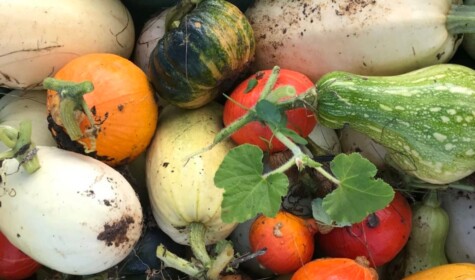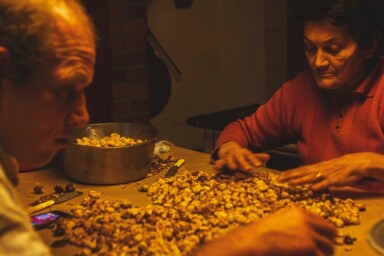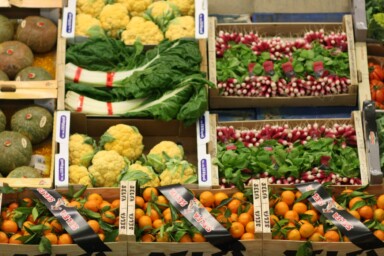National crises, like COVID-19 and Brexit, help to fix our minds on the fundamentals of existence, and encourage us to ask the big questions, like how a nation feeds itself. Given the way that food connects every element of our society and our economy, as well as linking us with the natural world, it has the power to bring us together into a collective effort that allows us to face other challenges that have been there all along: climate change, for instance, poverty and isolation. It is, however, a fearsome challenge, requiring national and local government, farmers, food businesses and the public to all change their ways in a coordinated fashion.
Policy happens at many levels. Locally, the civic response to lockdown demonstrated the public enthusiasm for being part of a community that looks after its members and has a connection to the geography it inhabits. There was a surge of enthusiasm for growing food at home and in community gardens, buying from farmers and small shops, and creating new short supply chains. From there the next logical step is to build partnerships with local authorities, translating citizen power into political action.
National government, however, is another story. Vested interests, the short-term thinking produced by the electoral cycle and the tendency of policy to fragment into silos, so that health, farming, the food industry and the environment pull in different directions, all mean that the top-down approach is rather limited in what it can achieve. Here it can be helpful to compare the approaches of different nations, and the UK provides an interesting case study in its devolved countries: Scotland, Wales and Northern Ireland. Although the UK government decides the terms of trade with other countries, and until now the EU has had strong control over farming support payments, many aspects of food production and consumption have for the past two decades been devolved to the respective administrations, leaving England to work separately from them. Each government has, consequently, come up with a different approach.
England’s current National Food Strategy is billed as the ‘first major review of our food system in 75 years’. It was commissioned in 2016 and is led by Henry Dimbleby, restaurateur and author of England’s 2013 School Food Plan, supported by Defra. The new strategy has a very wide remit, covering the actions of all government bodies with respect to the whole food chain, from production to marketing, processing, sale and consumption. This summer, it published Part One of the Strategy, which covers the response to COVID-19, the challenges of Brexit and the growing threat of climate change.
It identified two main themes. One is the importance of responding to child poverty. ‘A Government that is serious about “levelling up” must ensure that all children get the nutrition they need,’ says the report, pointing out the dangers of both obesity and diabetes, which tend to fall on the poorest families. Nevertheless, this high aspiration has not been easy to achieve in practice, as became clear earlier this year when it took a campaigning footballer, Marcus Rashford, to push the government into a u-turn over free school meals vouchers in the summer holidays. This argument has reappeared for the autumn half term.
The other theme is the ‘freedom to uphold our own values and principles within the global marketplace,’ which Dimbleby holds to be compatible with setting high food standards and protecting the environment. This too came into question when Parliament decided not to require imported food to meet domestic legal standards from 1st January 2021, much to the disappointment of the farming unions and food campaigners.
England also has a strong civil society movement which parallels government activity, including such initiatives as the People’s Food Policy, which aims to integrate ‘the compartmentalised policy realms of food production, health, labour rights, land use and planning, trade, the environment, democratic participation and community wellbeing’. Led by the Land Workers’ Alliance, the Permaculture Asssociaton, Global Justice Now and backed by 100 organizations, it takes a radical approach foregrounding food sovereignty and agroecology and remains an aspiration.
Scotland has achieved a closer integration between civil society and government, expressed by the 2014 Good Food Nation policy, which has a mixture of legislation and non-legislative actions. According to the Government website, the aim is that by 2025 Scotland will be ‘a Good Food Nation, where people from every walk of life take pride and pleasure in, and benefit from, the food they produce, buy, cook, serve, and eat each day.’ Much of the drive from this has come from the Scottish Food Coalition which has from the outset insisted on a whole-system approach based on food justice, engaging over 800 people in ‘Kitchen Table Talks’, which were held in homes, town halls, community gardens and other public places all over Scotland in 2018.
Based on this public mandate, Nourish Scotland and the Scottish Food Coalition are now campaigning for a Good Food Nation Bill that will embed this joined up approach deeper in government. They want to build the right to food into Scottish law, establish an independent food commission, produce regular food plans, hold public bodies to account and set targets covering areas such as obesity, greenhouse gas emissions and wages in the food industry. The pandemic has delayed its progress but they are confident of success in the 2021/22 session.
Wales has had a number of food strategies, although none with quite the whole-system approach that is developing in Scotland. The 2010 strategy Food for Wales, Food from Wales was broadly based and considered health, social issues and the environment, but the accompanying action plan that followed in 2014, Towards Sustainable Growth, was heavily biased toward the food industry. Focussing on the need to support exports and jobs, it had little to say about food poverty or the environment. Health and child poverty come under separate portfolios.
Like Scotland and England, Wales has a civil society movement which is calling for wider changes in food and farming, but it is less strongly organised. The Welsh Food Manifesto identifies ten principles that would allow different sectors to come together on the basis of shared values, while an alliance of NGOs led by the WWF recently commissioned the report A Welsh Food System Fit for Future Generations, and they are now calling for a Food System Commission. Many other networks use food as a rallying point, and an informal coalition is gradually emerging.
Wales does however have a legislative vehicle for uniting civil society and government actions, in the shape of the Well-being of Future Generations Act. This visionary legislation, passed in 2015, requires government bodies, including local authorities, to collaborate with all its stakeholders – community groups, businesses and individuals – in order to plan for the long-term future. It is ambitious, requiring a set of ‘new ways of working’ that challenge long-established habits. There are some hopeful signs, such as the recent collaboration between food service firm Castell Howell and Ceredigion County Council, as well as a public procurement initiative in Carmarthenshire.
Northern Ireland has similarities with Wales, in that Government policy separates its Growing for Growth agri-food policy from its Fitter Future for All health strategy and its plans for farming support, while its civil society has more ambitious ideas. The suspension of Government for the three years to January 2020, leaving the civil service to engage with the public, has of course presented an additional problem. However, as Belfast academic Dr Viviane Gravey notes, a fresh view of the way forward comes from the RSA’s Food Farming and Countryside Commission (FFCC) Northern Ireland report, which offers a visionary plan based on building trust across sectors.
The FFCC, which produced reports covering the whole of the UK, is now an independent organisation and offers hope of a new approach, although the fundamental challenge remains the same. Changing our food system is a huge task that requires everyone to work together. There is no one way of doing things. The examples above suggest the importance of a national strategy, one that is based on good food for all, or the right to food; strong government support at both national and local levels; and an organised civil society movement, one that has genuine grassroots support. There is no one way of achieving this, but much to learn from seeing how the devolved nations of the UK (as well as nations beyond the UK) can respond differently to a common challenge.







